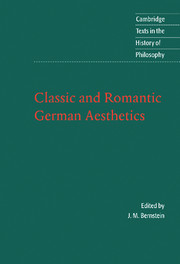Book contents
- Frontmatter
- Contents
- Introduction
- Chronology
- Further reading
- Note on the texts
- Aesthetica in nuce: A Rhapsody in Cabbalistic Prose (1762)
- Laocoön: An Essay on the Limits of Painting and Poetry (1766)
- From ‘On the Artistic Imitation of the Beautiful’ (1788)
- ‘Kallias or Concerning Beauty : Letters to Gottfried Körner’ (1793)
- ‘Oldest Programme for a System of German Idealism’ (1796)
- ‘Letter to Hegel, 26 January 1795’
- ‘Being Judgement Possibility’ (1795)
- ‘The Significance of Tragedy’ (1802)
- ‘Remarks on Oedipus’ (1803)
- From Miscellaneous Remarks (1797)
- ‘Monologue’
- ‘Dialogues’ (1798)
- ‘On Goethe’ (1798)
- ‘Studies in the Visual Arts’ (1799)
- From ‘Critical Fragments’ (1797)
- From ‘Athenaeum Fragments’ (1798)
- From ‘Ideas’ (1800)
- ‘On Goethe's Meister’ (1798)
- ‘Letter About the Novel’ (1799)
- ‘On Incomprehensibility’ (1800)
- Index
- Cambridge texts in the history of philosophy
‘Letter About the Novel’ (1799)
Published online by Cambridge University Press: 05 June 2012
- Frontmatter
- Contents
- Introduction
- Chronology
- Further reading
- Note on the texts
- Aesthetica in nuce: A Rhapsody in Cabbalistic Prose (1762)
- Laocoön: An Essay on the Limits of Painting and Poetry (1766)
- From ‘On the Artistic Imitation of the Beautiful’ (1788)
- ‘Kallias or Concerning Beauty : Letters to Gottfried Körner’ (1793)
- ‘Oldest Programme for a System of German Idealism’ (1796)
- ‘Letter to Hegel, 26 January 1795’
- ‘Being Judgement Possibility’ (1795)
- ‘The Significance of Tragedy’ (1802)
- ‘Remarks on Oedipus’ (1803)
- From Miscellaneous Remarks (1797)
- ‘Monologue’
- ‘Dialogues’ (1798)
- ‘On Goethe’ (1798)
- ‘Studies in the Visual Arts’ (1799)
- From ‘Critical Fragments’ (1797)
- From ‘Athenaeum Fragments’ (1798)
- From ‘Ideas’ (1800)
- ‘On Goethe's Meister’ (1798)
- ‘Letter About the Novel’ (1799)
- ‘On Incomprehensibility’ (1800)
- Index
- Cambridge texts in the history of philosophy
Summary
[In this extract, Antonio, one of the main interlocutors of the Dialogue, speaks to Amalia. The context becomes clear below.]
I must retract, my dear lady, what I seemed to say yesterday in your defence, and say that you are almost completely wrong. You yourself admitted as much at the end of the argument, having become involved so deeply, because it is against female dignity to come down in tone, as you so aptly put it, from the innate element of gay jest and eternal poetry to the thorough or heavy-handed earnestness of the men. I agree with you against yourself that you are wrong. Indeed, I maintain that it is not enough to recognize the wrong; one must make amends for it and, as it seems to me, proper amends for having degraded yourself with your criticism would now be that you force yourself to the necessary patience and read this critical epistle about the subject of yesterday's conversation.
What I want to say I could have said yesterday; or rather I could not have because of my mood and the circumstances. What kind of opponent are you dealing with, Amalia? Certainly he understands quite well what it is all about, as it could not otherwise be with a clever virtuoso. He could have talked about it as well as anyone else, provided he could talk at all.
- Type
- Chapter
- Information
- Classic and Romantic German Aesthetics , pp. 287 - 296Publisher: Cambridge University PressPrint publication year: 2002

